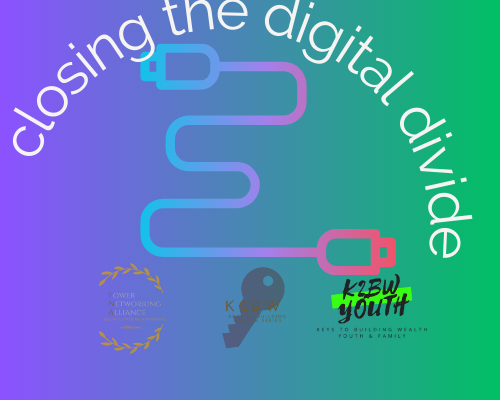The ongoing COVID-19 global pandemic has exposed significant social inequities, particularly impacting Black, Indigenous, Latino, and Communities of Color, low-income communities, students, and elders. Digital access and utilization have been no exception. With the transition to virtual instruction during the Spring of 2020, many students and their families faced difficulties in accessing essential technical equipment like laptops, high-speed Internet services for multiple users, and the necessary knowledge and support to thrive in a virtual learning environment.

To address these challenges, the PNA | K2BW has a comprehensive approach to support students and families historically excluded from accessing quality digital services. The proposed solution encompasses the following key elements:
- Affordable Broadband Internet Service: Ensuring residents in need can access and afford internet services.
- Internet-Enabled Devices: Providing devices that cater to users’ requirements, bridging the hardware gap.
- Digital Literacy Training: Offering training to empower individuals with essential digital skills.
- Applications and Online Content: Developing user-friendly resources that encourage self-sufficiency, workforce readiness, community participation, and collaboration.
We directly address the barriers to digital access and provide in-person online assistance for residents needing help with basic use of computers, the internet, and online services and applications. We also directly address people’s barriers to digital access with affordable connectivity sign-ups. PNA | K2BW provides the necessary technologies (laptops, hotspots, etc.) for Digital Navigators to distribute to those furthest from digital equity, as identified by the Digital Navigators. Our multi-pronged approach addresses the three foundations of digital equity –
(1) Lack of affordable and adequate internet access,
(2) lack of hardware (laptops, modem, hotspot), and
(3) digital literacy – while centering King and Pierce County Washington low-income communities, students, elders, communities of color, residents who need assistive technology, and others who are most affected by the digital inequities.
We target:
1) Kids and families who cannot access public education;
2) Elders and seniors who cannot access telehealth and tele-mental health services;
3) Unemployed and Underemployed individuals impacted by COVID-19 who cannot access essential services and job training.

Digital Literacy Learning Series provided in Hybrid format
Topics include: Skill Assessments, Essential Computer and Software Skills, Using Technology in Daily Life, Employment Technology, Student Success


